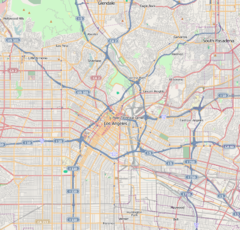Griffith Park Observatory
| Griffith Observatory | |
|---|---|

Griffith Observatory, September 2006
|
|
|
Location within Los Angeles
|
|
| General information | |
| Architectural style | Art Deco |
| Location | Los Feliz, Los Angeles, California, United States |
| Coordinates | 34°07′07″N 118°18′01″W / 34.11856°N 118.30037°WCoordinates: 34°07′07″N 118°18′01″W / 34.11856°N 118.30037°W |
| Elevation | 1,135 ft (346 m) |
| Construction started | June 20, 1933 |
| Client | Griffith Trust |
| Design and construction | |
| Architect | John C. Austin Frederick M. Ashley |
| Website | |
| GriffithObservatory.org | |
| Designated | November 17, 1976 |
| Reference no. | 168 |
Griffith Observatory is a facility in Los Angeles, California, sitting on the south-facing slope of Mount Hollywood in Los Angeles' Griffith Park. It commands a view of the Los Angeles Basin, including Downtown Los Angeles to the southeast, Hollywood to the south, and the Pacific Ocean to the southwest. The observatory is a popular tourist attraction with an excellent view of the Hollywood Sign, and an extensive array of space and science-related displays. Since the observatory's opening in 1935, admission has been free, in accordance with the benefactor's will, after whom the observatory is named – Griffith J. Griffith.
3,015 acres (12.20 km2) of land surrounding the observatory was donated to the City of Los Angeles by Griffith J. Griffith on December 16, 1896. In his will Griffith donated funds to build an observatory, exhibit hall, and planetarium on the donated land. Griffith's objective was to make astronomy accessible by the public, as opposed to the prevailing idea that observatories should be located on remote mountaintops and restricted to scientists.
Griffith drafted detailed specifications for the observatory. In drafting the plans, he consulted with Walter Adams, the future director of Mount Wilson Observatory, and George Ellery Hale, who founded (with Andrew Carnegie) the first astrophysical telescope in Los Angeles.
As a Works Progress Administration (WPA) project, construction began on June 20, 1933, using a design developed by architect John C. Austin based on preliminary sketches by Russell W. Porter. The observatory and accompanying exhibits were opened to the public on May 14, 1935. In its first five days of operation the observatory logged more than 13,000 visitors. Dinsmore Alter was the museum's director during its first years.
...
Wikipedia

